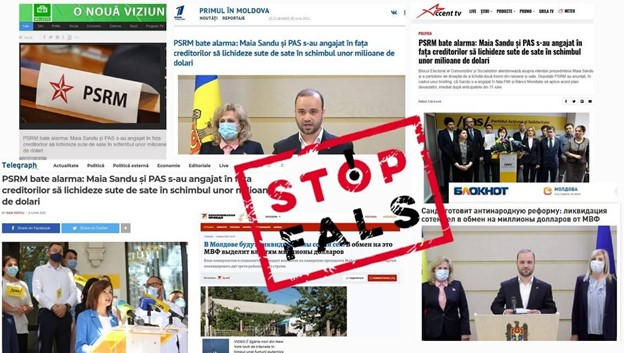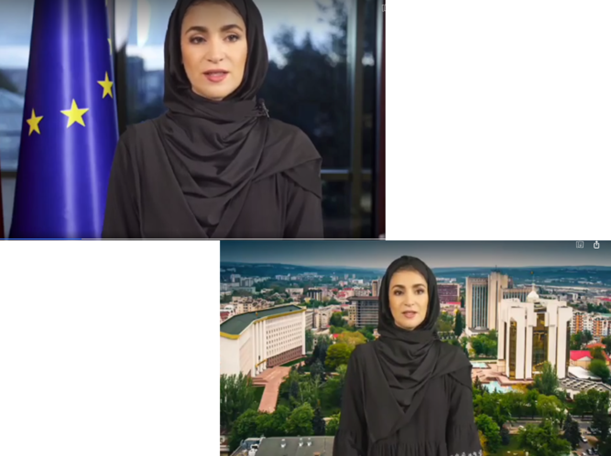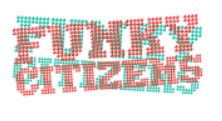NATO as the Scarecrow – Narrative Specific to Pro-Kremlin Politics
At the beginning of the election period, pro-Kremlin media sources speculated on the modernization of the railway infrastructure between Romania, Moldova and Ukraine. A recent article published by Vedomosti.md, which used to be the website of “Moldavskie Vedomosti”, states that Moldova "opens the way for military echelons to Ukraine", referring to the intention of the Romanian, Moldovan and Ukrainian authorities to modernize their railway sections. Stopfals.md has refuted this fake and the journalists actually showed that the Romanian authorities had been planning to modernize the railways between Moldova and Romania since before the war, according to the 2021–2027 Transport Program – in the version approved by the European Commission. However, this website was blocked around election time.
Vedomosti.md is a pro-Kremlin and anti-European media outlet, which periodically publishes articles containing fakes with the propaganda narratives spread by the Russian Federation.
The narrative that Moldova facilitates the passage of NATO military equipment through Romania is an “old song”, frequently used in Moldovan elections. Before the 2022 parliamentary elections, the pro-Kremlin news portal Sputnik.md published an article with the same narrative, claimed that the NATO "Sea Shield 2021" naval military exercises, which took place in Romania in the spring that year, were directed against Russia and aimed at destabilizing the situation in the Black Sea region.
 Collage Stopfals.md
Collage Stopfals.md
Liquidation of Villages – Election Phobia
Another old scarecrow, taken over from other elections and disseminated in these local elections, is the liquidation of villages and communes. The candidate of the Communists Party (PCRM) for the position of Mayor of Chișinău, Diana Caraman, published a video on Facebook, in which she claimed the authorities were planning to implement an administrative reform involving "liquidation" of villages, communes, towns and districts, and merging a number of them, referring to the Public Administration Reform Strategy.
The "village liquidation" narrative was used as a scarecrow tactic in the election campaigns before. Moreover, in the run-up to the 2021 parliamentary elections, pro-PSRM (Party of Socialists from the Republic of Moldova) media portals published articles stating that "the destructive plan of right-wing parties and President Maia Sandu is to liquidate two-thirds of districts and villages after the elections," declared the socialist Igor Dodon, the former president of the country, Maia Sandu's counter-candidate, referring to one of the proposals for an administrative-territorial reform.
Stopfals.md wrote that, in reality, that reform was proposed in 2020 by the former Prime Minister Ion Chicu, promoted by PSRM itself. This false message was also promoted during the 2020 presidential election campaign. Then, Stopfals.md refuted several false claims made by Socialist candidate Igor Dodon, including that "Maia Sandu has liquidated schools, hospitals, town halls and has eliminated the Russian language from schools".

The "liquidation of villages" narrative promoted in the 2021 parliamentary elections. Source: Stopfals.md
‘Crises’ Lies
The authors spreading disinformation during the elections base their speculations on people’s phobias and the issues the country is currently facing. With the winter approaching, some politicians have speculated on the acute international energy crisis, with the aim of manipulating public opinion. For example, the politician Ilan Shor and the Bashkan of Gagauzia (the bashkan is the governor of an autonomous territorial unit), Evgenia Gutul has announced signing of an agreement with a Turkish company to provide consumers in the region with gas at 10 Moldovan Lei (equivalent to 50 cents) per cubic meter.
Gagauzia, or officially the Autonomous Territorial Unit of Gagauzia, is an autonomous region (since 1995) in the south-west of the Republic of Moldova, inhabited mainly by the Gagauz, a people speaking a Turkic language and culturally close to the Turks, but of the Orthodox Christian denomination. The region is divided into three administrative districts: Comrat, Ciadîr-Lunga and Vulcănești.
For many Gagauzians, Russia remained in the collective memory as a kind of liberator. During the Soviet period, the Gagauzians massively adopted the Russian language, which became dominant in the region. Residents of this region get their information, mostly from pro-Kremlin media sources.
The agreement mentioned above is false information that has been confusing people since its spread. According to Moldovan Energy Minister Victor Parlicov, the contract on the purchase of gas at a price of 10 lei, published by the Bashkan of Gagauzia, is a fake document and cannot be put into work. Currently, domestic consumers pay 18.6 lei (including VAT) for one cubic meter of gas. The official of the Ministry also specified that the representatives of the Turkish company denied signing such agreement.
From Speculation and Disinformation to Deepfake
Various techniques of manipulation and disinformation have been used in this election campaign as well. The day before the local elections in Moldova on November 5th, a fake video was published on Facebook in which President Maia Sandu allegedly referred to the ‘disastrous situation’ in the country and the ‘burial of democracy’, asking people to vote for the candidate of the "Renaissance" party, which is a satellite of ȘOR political party, banned in Moldova. This video is a deepfake, and so is the voice.

The President of the Republic of Moldova, Maia Sandu, the protagonist of a deepfake distributed
in social networks before the general local elections in November 2023. Video capture collage.
The video went viral and managed to gather over 400 thousand views, because of paid promotion. The video of Maia Sandu's alleged speech was published on the account of "Moldova Prietenoasă" (Friendly Moldova), created in May 2023,which promotes information in favor of Ilan Shor - the founder of ȘOR political party. Subsequently, after Stopfals.md journalists refuted the article, Meta removed the video from the social media.
Moldovan Authorities Act Drastically to Stop Disinformation During Elections
In order not to let disinformation run rampant before the elections, the Moldovan authorities resorted to drastic measures: they have blocked 30 websites with pro-Kremlin editorial affiliations.
Just a few days before the first round of the elections, the Intelligence and Security Service (ISS) asked the Emergency Situation Commission to suspend the operation of six TV stations during the state of emergency: Orizont TV, I-tv, Prime, Publika TV, Channel 2 and Channel 3 – all of them politically affiliated to Ilan Șor.
The head of the ISS (Intelligence and Security Service), Alexandru Musteață explained the reasons for the ISS action at a press briefing, claiming the purpose of the suspension was to ensure information security in the context of hybrid attacks on Moldova:
"In recent months, we have seen an increase in cyber-attacks and an increase in information security risks, especially during the election period. We have information and evidence that the Russian Federation is influencing the local elections on 5 November and undermining the democratic process in our country. This is happening through a number of methods involving illegal campaign financing, vote buying and corruption of candidates, as well as disinformation campaigns," the Head of the ISS specified. Alexandru Musteață also mentioned that these stations constantly spread manipulative narratives which, together with the informational aggression coming from outside the Republic of Moldova, generated an additional source of instability in the vicinity of Ukraine, NATO and the EU.
Local Elections – Test for Presidential Elections: East or West?
The restrictive actions of the Moldovan authorities were mentioned in the report of the Joint Observation Mission of the OSCE Office for Democratic Institutions and Human Rights (ODIHR), the Congress of Local and Regional Authorities of the Council of Europe (Congress) and the European Parliament (EP). A press release issued immediately after the first round of elections states that “the extensive powers of the Emergency Situation Commission were used to restrict freedom of expression and association and the right to stand as a candidate, and foreign interference and widespread allegations of voter corruption throughout the election campaign were cause for concern".
The local elections were a test for the next year's presidential elections and the 2024 European parliamentary elections, where about one third of Moldovan citizens will be able to participate in the European poll because they are also citizens of an EU member state. Preventing disinformation during elections is crucial to maintaining the integrity of the democratic process. This is why there is a need for several actors, both state institutions and civil society organsations, to promote civic education in communities in order to educate citizens about the election process, including how to identify and deal with false information.
Background photo by: TI-Moldova
Author: Lilia Zaharia from TI-Moldova
This article was published in partnership with Funky Citizens
